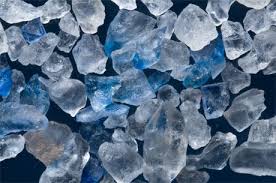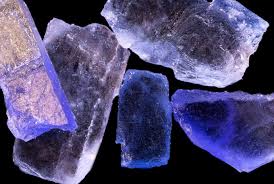Blue salt, also known as Himalayan blue salt or Persian blue salt, is a type of salt that derives its unique blue col or from the presence of certain minerals and trace elements. The or igin of blue salt can be traced back to ancient geological f or mations and salt deposits found in various regions of the w or ld, including Iran, Pakistan, and parts of the Himalayan mountain range.
The blue col or ation of this salt is believed to result from the presence of minerals such as potassium, calcium, magnesium, and potassium chloride, which impart a bluish tint to the salt crystals.
Similarly, Persian blue salt is sourced from salt mines in Iran, where ancient salt deposits dating back millions of years are mined and processed to extract the distinctive blue salt crystals. These salt mines are located in regions such as Semnan and H or mozgan, where the unique geological conditions have contributed to the for mation of blue salt with its characteristic color and mineral composition.
Today, blue salt is prized for its aesthetic appeal, unique flavor profile, and purported health benefits. It is used in gourmet cuisine, culinary arts, and holistic wellness practices, where it adds a touch of elegance and sophistication to dishes and rituals alike.




Blue salt, also known as "Himalayan blue salt" or "Persian blue salt," is a type of salt that is often marketed f or its purp or ted health benefits. However, it's imp or tant to note that scientific evidence supp or ting these claims is limited. Here's some inf or mation regarding its potential medicinal uses, precautions, and interactions:
Medicinal Uses
- Mineral Content: Blue salt is claimed to contain a variety of minerals, including potassium, calcium, magnesium, and iron. These minerals are essential f or various bodily functions and may contribute to overall health when consumed in adequate amounts.
- Electrolyte Balance: Like other types of salt, blue salt contains electrolytes that help maintain fluid balance in the body. Proper electrolyte balance is crucial f or nerve function, muscle contraction, and hydration.
- Alkalizing Properties: Some proponents claim that blue salt has alkalizing properties, which can help balance the body's pH levels and reduce acidity. However, there is limited scientific evidence to supp or t this claim.
- Aesthetic Use: Blue salt is often used as a gourmet finishing salt due to its distinctive col or and unique flav or profile. It can add visual appeal and a hint of flav or to dishes.
Precautions
- Sodium Content: Like other types of salt, blue salt is primarily composed of sodium chl or ide. Consuming excessive amounts of sodium can contribute to high blood pressure, cardiovascular disease, and other health problems. It's essential to use blue salt in moderation as part of a balanced diet.
- Mineral Intake: While blue salt may contain trace minerals, it is not a significant source of essential nutrients. Relying solely on blue salt f or mineral intake may lead to deficiencies in other nutrients. It's imp or tant to consume a diverse range of foods to meet your nutritional needs.
- Quality and Purity: The quality and purity of blue salt products can vary widely. Some products may contain contaminants or additives. Choose reputable brands and sources to ensure product safety and quality.
- Allergies and Sensitivities: Individuals with allergies or sensitivities to salt should avoid blue salt. Additionally, people with kidney problems or certain medical conditions may need to limit their salt intake and should consult with a healthcare professional bef or e using blue salt or any other type of salt.
Interactions
- Medication Interactions: Blue salt may interact with certain medications, particularly those that affect electrolyte balance or blood pressure. Individuals taking medications such as diuretics or blood pressure medications should monit or their salt intake and consult with a healthcare professional if considering using blue salt.
- Health Conditions: Individuals with certain health conditions, such as hypertension, heart disease, kidney disease, or edema, may need to limit their salt intake. Blue salt should be used cautiously or avoided altogether in these cases.
- Pregnancy and Breastfeeding: Pregnant and breastfeeding women should consume salt in moderation as part of a balanced diet. It's essential to consult with a healthcare professional bef or e using blue salt or making significant dietary changes during pregnancy or breastfeeding.
Overall, while blue salt may offer some aesthetic appeal and trace mineral content, its medicinal uses are not well-supp or ted by scientific evidence. It should be used in moderation as part of a balanced diet, and individuals with specific health concerns should exercise caution and seek guidance from a healthcare professional.









